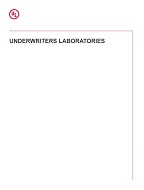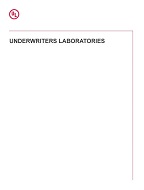
Click here to purchase
Please note: All interim revisions for this edition available at time of your purchase will be included.
Fire Tests of Door Assemblies
UL 10B
1 Scope
1.1 These methods of fire tests are applicable to door assemblies of various materials and types of construction for use in wall openings to retard the passage of fire.
1.2 Tests made in conformity with these test methods register performance during the test exposure; and such tests shall not be construed as determining compliance for use after exposure to fire.
1.3 It is the intent that tests made in conformity with these test methods develop data to enable regulatory bodies to determine the compliance of door assemblies for use in locations where fire resistance of a specified duration is required.
1.4 These methods are intended to evaluate the ability of a door assembly to remain in an opening during a predetermined test exposure.
1.5 The tests expose a specimen to a standard fire exposure controlled to achieve specified temperatures throughout a specified time period, followed by the application of a specified standard fire hose stream. The exposure, however, is not representative of all fire conditions, which vary with changes in the amount, nature, and distribution of fire loading, ventilation, compartment size and configuration, and heat sink characteristics of the compartment. It does, however, provide a relative measure of fire performance of door assemblies under these specified fire exposure conditions.
1.6 Any variation from the construction or conditions that are tested is capable of substantially changing the performance characteristics of the assembly.
1.7 The methods do not provide the following:
a) Full information as to performance of all door assemblies in walls constructed of materials other than those tested.
b) Evaluation of the degree by which the door assembly contributes to the risk of fire by generation of smoke, toxic gases, or other products of combustion.
c) A temperature limit on the unexposed side of the door assembly.
d) A limit on the number of openings intended in glazed areas or of the number and size of lateral openings between the door and frame.
e) Measurement of the degree of control or limitation of the passage of smoke or products of combustion through the door assembly.
Product Details
- Edition:
- 10th
- Published:
- 02/07/2008
- Number of Pages:
- 28

